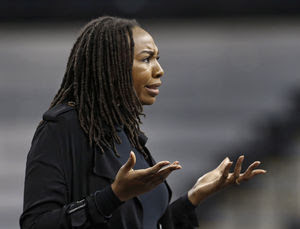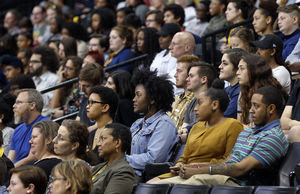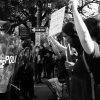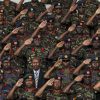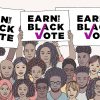Black Lives Matter grew into more than a social media hashtag when “real people were willing to put their bodies on the line” and challenge a system that says black lives don’t matter, Opal Tometi, one of the movement’s founders, said Thursday.
If you aren’t actively part of the movement, Tometi said, “you are on the side of injustice. At times like this, you don’t get to sit on the sidelines. You just don’t.”
Describing herself as an organizer and “an abolitionist for the 21st century,” Tometi urged nearly 1,000 people at Virginia Commonwealth University’s Siegel Center to take a stand for “a multiracial democracy that actually works for all of us.”
“We already have a multiracial society,” she said, but it’s a society where the status quo supports a system in which “some lives are more valuable than others” and some people get to survive when others don’t.
“The system’s working as it was designed,” Tometi said, so challenging it is “the noble and right thing to do.”
“It is your civic duty to dissent, to call it out and to change it,” she said.
Referencing the words of the Rev. Dr. Martin Luther King Jr. on the arc of history, Tometi urged that they join the effort and “actually bend that arc toward justice.”
Tometi, the daughter of Nigerian immigrants, is executive director of the Black Alliance for Just Immigration. She lives in New York.
Her talk was sponsored by the VCU School of Social Work and coordinated by the School of Social Work Black Lives Matter Student-Faculty Collective.
Daryl Fraser, an assistant professor in teaching and member of the collective, said the Black Lives Matter movement resonates with the core beliefs of social workers, who are activists and community organizers, “but above all we’re champions of social justice.”
Social work, Tometi said, provides a context for thinking about problems and creating tools to address them.
She said she is working with a group in New York called Safety Beyond Policing to shift funding away from law enforcement and toward social workers, teachers and health professionals.
The goal is to address problems by “defining safety in our own terms,” she said.
Tometi described how she created the #BlackLivesMatter hashtag with Alicia Garza and Patrisse Cullors after the shooting death of Trayvon Martin.
She recalled the exact moment in 2013 that she heard that George Zimmerman had been acquitted in the slaying of the 17-year-old in a case that “put Trayvon Martin on trial for his own murder.”
“I felt like I was punched in the gut,” she said.
She thought of her then-14-year-old brother and how the acquittal would mark his generation. She realized she had to do something more, knowing that his life also could be taken at any moment.
“I wanted to be part of something bigger,” she said, and thus Black Lives Matter was fueled by love for her brother.
It’s “a love movement,” Tometi said, one that is intended to bring about “another world where in fact all lives matter.”
When you live in a society where the black community faces high unemployment and health discrepancies, and disproportionately large numbers are incarcerated, “you have to speak up about it,” she said.
“And that in essence is what Black Lives Matter is all about.”

